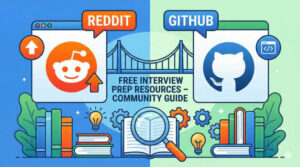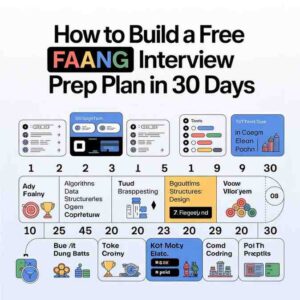Preparing for senior software engineering interviews at top tech companies like Uber and Google requires an in-depth understanding of a wide range of topics. This comprehensive guide outlines the key areas of knowledge and skills you need to master to excel in these interviews. Covering data structures, algorithms, system design, microservices, and more, this roadmap will help you build a strong foundation and boost your confidence for L5A, L5B, or L5/L6 level interviews.
Data Structures
Key Topics
Arrays: Basic operations, dynamic arrays.
Linked Lists: Singly linked lists, doubly linked lists.
Queues: Circular queues, priority queues.
Stacks: Applications in expression evaluation.
Hash Tables: Collision resolution techniques.
Graphs: Representation, traversal algorithms (BFS, DFS), shortest path algorithms (Dijkstra’s, Bellman-Ford).
Trees: Binary trees, binary search trees, AVL trees, red-black trees, B-trees.
Special Trees: Fenwick trees, segment trees, trie.
Sets: Disjoint set union (union-find), Bloom filters.
Study Tips
Practice implementing these data structures from scratch.
Solve problems on platforms like LeetCode, HackerRank, and CodeSignal.
Mathematics
Key Topics
-
Probability and Statistics: Basic concepts, combinatorics.
-
Mathematical Series: Arithmetic, geometric, and harmonic series.
Study Tips
-
Review high school and college-level mathematics.
-
Practice solving probability and combinatorial problems.
Algorithmic Concepts
Key Topics
Time and Space Complexity: Big O notation, analyzing the efficiency of algorithms.
Recurrence Relations: Solving recurrence relations using methods like substitution and master theorem.
Study Tips
Study common algorithms and their complexities.
Understand how to derive and solve recurrence relations.
Algorithms
Key Topics
Sorting Algorithms: Quick sort, merge sort, heap sort, insertion sort, bubble sort, counting sort, radix sort.
Divide and Conquer Algorithms: Examples like merge sort and quick sort.
Dynamic Programming: Top-down and bottom-up approaches, memoization.
Greedy Algorithms: Examples like Kruskal’s and Prim’s algorithms.
Pattern Matching: KMP algorithm, Rabin-Karp algorithm.
Graph Algorithms: Shortest path, minimum spanning tree.
Backtracking: N-queens problem, Sudoku solver.
NP-Completeness: Understanding the concepts of P, NP, NP-hard, and NP-complete problems.
Study Tips
Practice coding algorithms by hand and on coding platforms.
Focus on understanding the underlying principles and not just the implementation.
Operating Systems
Key Topics
Process Scheduling: Various scheduling algorithms.
Synchronization and Deadlocks: Mutexes, semaphores, deadlock prevention and detection.
Memory Management: Paging, segmentation.
File Systems: File allocation methods, directory structure.
User-Space Processes and Threading: Multithreading concepts, thread lifecycle.
Study Tips
Review operating systems textbooks like “Operating System Concepts” by Silberschatz.
Work on practical OS projects or exercises.
Databases
Key Topics
Relational Algebra: Basic operations.
Functional Decomposition: Normalization, dependency theory.
ER Schema Design: Designing entity-relationship diagrams.
Study Tips
Study database management systems (DBMS) concepts.
Practice designing and normalizing database schemas.
Database Usage
Key Topics
Database Concepts: ACID properties, CAP theorem.
Access Patterns: Efficient querying techniques.
Partitioning and Sharding: Data distribution techniques.
Concurrency Controls: Isolation levels, transaction management.
Database Indexing: Index types, usage.
NoSQL Databases: Deep dive into at least one NoSQL database.
Study Tips
Work with both SQL and NoSQL databases.
Practice writing complex queries and optimizing them.
Networks
Key Topics
OSI Model: Understanding each layer.
HTTP/1.1 and HTTP/2: Protocols and performance.
WebSocket Communication: Real-time data transfer.
TCP/IP Internals: Packet structure, error correction mechanisms.
SSL/TLS: Secure communication protocols.
Study Tips
Study networking fundamentals from books like “Computer Networking: A Top-Down Approach”.
Set up small network simulations using tools like Cisco Packet Tracer.
Distributed Systems
Key Topics
Consensus Protocols: Paxos, Raft.
Distributed Transactions: Two-phase commit, SAGA.
Distributed File Systems: HDFS, Google File System.
Distributed Hash Tables: Data distribution and lookup.
Study Tips
Study distributed systems concepts from “Designing Data-Intensive Applications” by Martin Kleppmann.
Work on distributed systems projects or simulations.
Compilers
Key Topics
Compilation Lifecycle: Lexical analysis, syntax analysis, semantic analysis, optimization.
AST and JIT Compilation: Abstract syntax tree, just-in-time compilation.
Key Optimizations: Techniques like tail call optimization.
Study Tips
Study compiler design from “Compilers: Principles, Techniques, and Tools” (the Dragon Book).
Work on small compiler projects to understand the compilation process.
Object-Oriented Programming (OOP)
Key Topics
Design Patterns: Factory, abstract factory, visitor, singleton, strategy, command.
OOPS Modeling: Heavy practice on OOPS modeling.
Study Tips
Study design patterns from “Design Patterns: Elements of Reusable Object-Oriented Software”.
Implement design patterns in different programming languages.
Programming Languages
Key Topics
Erlang: Understanding BEAM VM internals.
Python: Deep-dive into internals, functional vs imperative programming.
Functional Programming: Concepts like futures, closures, referential transparency.
Study Tips
Experiment with different programming paradigms.
Work on projects in various programming languages to understand their strengths and weaknesses.
Architecture
Key Topics
Microservices: Design principles, benefits, and challenges.
N-Tier Architecture: Separation of concerns.
MVC, MVVM: Design patterns for organizing code.
Study Tips
Study software architecture books like “Software Architecture Patterns” by Mark Richards.
Design and implement small systems using these architectural principles.
Microservice Architecture
Key Topics
Orchestration and Choreography: Managing service interactions.
Service Mesh: Implementing service discovery and management.
API Gateways: Managing API requests and responses.
Authentication and Authorization: Security practices.
Study Tips
Study microservices architecture from “Building Microservices” by Sam Newman.
Implement microservices using frameworks like Spring Boot, Docker, and Kubernetes.
System Design
Key Topics
Functional and Non-Functional Requirements: Gathering and analyzing requirements.
Performance and Load Budgeting: Estimating system performance.
Caching and Load-Balancing: Techniques and strategies.
Deployment and Instrumentation: Continuous integration and deployment.
Study Tips
Study system design from “Designing Data-Intensive Applications”.
Practice designing systems and presenting your designs.
Caching
Key Topics
Caching Types: L1, L2, and distributed caches.
Eviction Strategies: LRU, MRU, LFU.
Manual Management: Cache invalidation and consistency.
Study Tips
Implement caching strategies in your projects.
Study caching techniques from various system design case studies.
Load Balancing
Key Topics
Load Balancing Techniques: L3, L4, L7.
API Gateway and Authentication Systems: Implementing and managing load balancers.
Network Servers: Reverse proxy servers, DNS load balancing.
Study Tips
Study load balancing from “High Performance Browser Networking” by Ilya Grigorik.
Implement load balancers using tools like Nginx and HAProxy.
Machine Learning
Key Topics
Statistical Machine Learning Algorithms: Regression, classification.
Neural Networks: Supervised and unsupervised learning, deep learning.
Study Tips
Study machine learning from “Pattern Recognition and Machine Learning” by Christopher Bishop.
Work on machine learning projects using frameworks like TensorFlow and PyTorch.
Miscellaneous
Key Topics
Performance Benchmarks: Understanding and utilizing benchmarks.
Data Transactions: In-depth knowledge of database transactions and concurrency.
Operational Transformation Algorithms: Real-time collaboration tools.
Study Tips
Stay updated with the latest research and trends in these miscellaneous areas.
Implement and experiment with new technologies and tools.


















